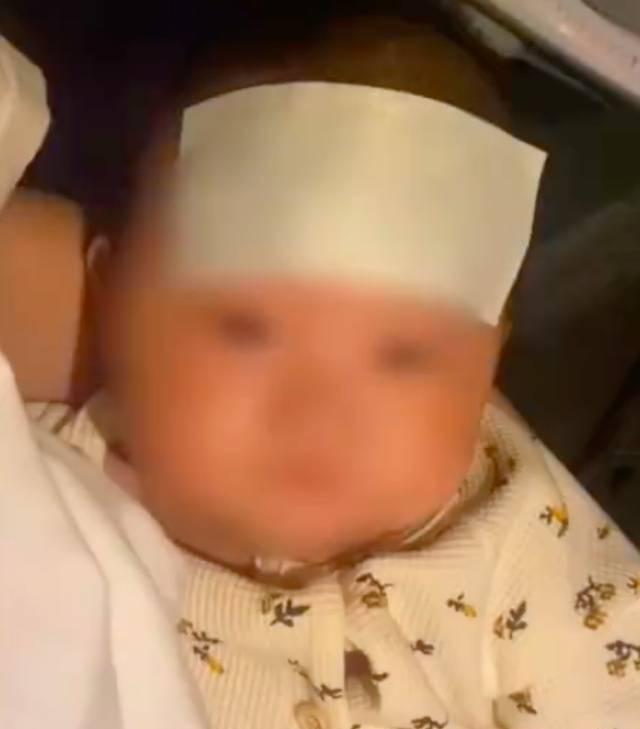01
On May 18, according to news reports, Ms. Cao from Jiaxing, Zhejiang Province recently took the baby back to her mother's house, and the family held the baby and kissed and touched it, but she did not expect that the baby had a sudden high fever that day, which attracted attention.

Ms. Cao, the mother, introduced that on the second day after returning to her mother's house, the family held the baby and kissed and touched, and after seeing it, the old man also agreed, and turned around and saw the baby being kissed again. "The old man is more stubborn, he thinks that the children are all kissed, which is nothing." Ms. Cao said.
In the afternoon, the baby had a fever of 39 degrees 7, the temperature at home was normal, and the child was diagnosed with a viral infection after seeking medical treatment. I think that the baby's fever may be infected by the germs on adults, the baby is only 3 and a half months old, and he still has repeated fever.
Public information shows that kissing disease is an acute self-limited infectious disease caused by Epstein-Barr virus, such as parents kissing children, mouth-to-mouth feeding, etc. can occur. Epstein-Barr virus infection can occur throughout the year, mostly in autumn and winter.
02
The news does not mention that the child has detected EBV, in fact, the symptoms caused by EBV are very similar to colds, and it is not easy to distinguish at all without specific testing, and the current EBV can be detected by antibodies or nucleic acid.
If it is really the symptoms caused by EBV, as a self-limited disease, rest well, and basically recover in 1-2 weeks. Conventional antiviral therapy is generally not recommended, and sensitive antimicrobials may be used if there is a bacterial infection.
The acute infectious disease caused by the Epstein-Barr virus is called infectious mononucleosis (IM). Its typical clinical "triad" is fever, angina, and cervical lymphadenopathy, which may be accompanied by hepatosplenomegaly, and the typical peripheral blood is characterized by increased lymphocytes and atypical lymphocytes.
A Nature article in April this year showed that more than 90% of the world's population has been infected by EBV infection, usually in childhood, but most of the disease is manifested as a recessive or mild infection. But the virus persists in the body, becoming latent or inactive, and sometimes reactivating. Long-term latent infection is associated with some chronic inflammation and a variety of cancers[1].
Epstein-Barr virus is mainly transmitted through oral contact, so EBV infection is also known as "kissing disease".
In addition, the symptoms of 'kissing disease' are very similar to the common cold, flu, and tonsillitis, and it is easy to misdiagnose and miss the diagnosis. If there is a child with recurrent fever, pharyngeal tonsillitis or cervical lymphadenopathy, when the symptomatic treatment is not obvious (fever persists), special attention should be paid to the blood test results, especially the counting and classification of atypical lymphocytes, and if necessary, EBV antibody and DNA tests can be performed for further identification and diagnosis.
Currently, there is no effective vaccine for infectious mononucleosis, so it is especially important to prevent infection:
1. Teach children to wash their hands frequently and practice hygiene
2. Don't suck your fingers
3. Families advocate "chopsticks and spoons" and do not share utensils
4. Do not allow children to eat food that adults have chewed
5. Parents do not feed mouth-to-mouth
Kissing a baby is a way for elders to show affection, but if you are unwell, kissing a child can cause the virus from your own body to spread to each other. Before the news broke that many young children were aggravated by "kissing disease", and even caused their lives to be in danger. Many viruses may not have obvious symptoms after infecting adults, but the baby's immune system is not fully developed, and the virus may be very lethal.
reference
[1] Li, J.S.Z., Abbasi, A., Kim, D.H. et al. Chromosomal fragile site breakage by EBV-encoded EBNA1 at clustered repeats. Nature 616, 504–509 (2023). https://doi.org/10.1038/s41586-023-05923-x